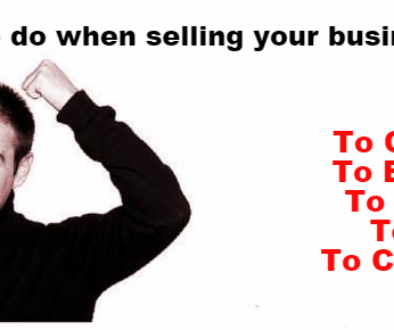Who Would Be the Buyer of Your Small Business? Part 1
The Individual Buyer Category represents the largest number of prospective buyers for small to midsize privately-held businesses.
Corporate Executives, Engineers and Salespeople make up a large portion of those who buy small to midsize businesses. They are often driven to buy their own business due to events in their corporate life such as being asked to move to another city, loss of their job due to corporate mergers or downsizing, being passed over for promotion or fed up with corporate bureaucracy. They tend to buy businesses that gross under $2 million.Foreign Buyers make up 30% to 40% of the buyers for small to midsize businesses and as much as 90% for specific type businesses such as convenience stores, dry cleaners and liquor stores. They are people who have moved to the US within the past few years. They usually work for family members or friends for a few years until they can better understand the American way of life. They often have substantial equity funds due to having sold their holdings in their country of origin and/or they are often able to borrow money from friends and relatives here in the US. Due to language barriers and an unfamiliarity with marketing techniques, they tend to buy businesses that do not require significant outside sales efforts and where the customers come to the business based on convenience rather than promotional activities.The majority of the individual buyers have little or no experience in operating the type of businesses they buy. The fact is, if individuals have a lot of experience in a specific business, they will tend to start a business rather than buy one. The number of entrepreneurs who start their own business are ten times greater than those who buy existing companies. Conversely, those people who start their own business are far more likely to fail or go out of business than those who have purchased an existing profitable business. Business brokers (business intermediaries) report that seven out of ten businesses they sell are still in business five years later.While on the surface it would appear that someone with a lot of experience in a specific business would be the best buyer; however, entrepreneurs who enjoy starting and growing an existing business have a start-it-from-scratch mentality. They don’t want to pay for something that they think they already know or can do themselves.Sources of equity and debt capital for individual buyers come from their own equity funds, family members, financial institutions and seller financing. Buyer equity funds usually represent 30% to 50% of the transaction price. The equity portion of the acquisition price must be liquid and available to the buyer unencumbered by debt. Mezzanine financing is not normally available to individual buyers.
Long-term financing is usually arranged through banks and mortgage companies usually in the form of the Small Business Administration’s 7A loan guarantee program. These loans are typically secured by the assets being acquired and the personal guarantee of the borrower. Owner financing is considered by the SBA as equity funds. For a target business to qualify for a buyer being able to obtain a SBA guaranteed loan to finance the tangible and intangible assets of a business, it must have been in business for at least three years and be able to provide three years of tax returns showing sufficient profits to repay the buyers loan and provide the buyer with a livable salary. Adjustments to the reported earnings are allowed for provable expenses that are either non-reoccurring or personal in nature; however, no consideration is given for unreported income. SBA financing may be available for businesses under three years old; however, these transactions are treated as start up businesses and must be fully secured by tangible assets. No portion of goodwill or intangible value will be financed.
A significant portion of transactions involving small to midsize target firms are seller financed. This is usually due to the target company’s poor financial record keeping or when the business has been in business for less than three years. Transactions properly structured are usually successful. In fact, after a seller-financed note has matured for six months to one year, there are several national companies who buy owner financed notes. Typical owner financing includes a reasonable selling price, a down payment of 30% to 45% and a payout of 5 to 7 years, with interest at 10%. The note is typically secured by the assets of the business being acquired and the personal guarantee of the buyer. A lien showing the note security is filed with the Secretary of State or required public records. Furthermore, the terms of the note should allow for the note holder to invoke rapid foreclosure proceeding in the event of default.
Acquisition Criteria of the Individual Buyer:
Target companies typically have gross revenues between $200,000 to $3 million. Businesses with gross revenue under $200,000 typically do not provide sufficient net earnings to attract buyers. Businesses with gross revenue in excess of $3 million become difficult for individuals to obtain the necessary financing and to compete with other categories of buyers seeking the larger businesses.
Individual Buyers tend to seek businesses that provide products and/or services that are easy to learn without long periods of training and high costs of entry. Many retail, wholesale, distribution, and service businesses meet this criteria. Businesses requiring professional licensing are usually limited to buyers who either have the license or can get one without incurring major costs or time delays.
Most individual buyers seek businesses that have current earnings at least similar to their most recent salaries, and upside potential for earnings growth. Buyers look for businesses that have good growth potential, but they are not willing to pay a price based on future potential.
While financial results is important, other lifestyle considerations can be equally important. Issues such as being able to control one’s destiny rather than letting someone else do it for them; building equity for the future rather than working at a limited future job that can end at someone else’s decision; and being able to choose when and where you go to work.
Location of the business in proximity to the buyer’s home is often a significant consideration. The business must have “curb appeal.” The condition and appearance of the equipment and facilities must be appealing or at least not unappealing. A little paint and attention to cleanliness goes a long way towards making a business attractive.
Businesses with full-time employees give buyers confidence that the business has continuity and stability. Having employees who can run the daily operations is more appealing than those businesses that are highly reliant on the owner to make daily operating decisions or have personal relationships with the company’s customers.
Businesses that have verifiable and current financial records enable a buyer to quickly do their due diligence and obtain sources of financing. While allowances can be made for non-recurring and personal expenses that impact the bottom line, no allowances are made for income missing from the top line.
While buyers may not always know the latest techniques for valuing businesses, they are capable of determining if the business makes sufficient earnings to earn a livable salary, pay the new debt service and provide a reasonable return on their investment. Ultimately, these factors are the test to see if the price and terms of any deal are reasonable.
Selling a business can be a traumatic and frustrating experience or it can be a financially rewarding experience providing peace of mind knowing that the business will continue on with job security for its employees and a continuing source of products and services for its customers. Owning a business is part of the American dream. Cashing out can be the continuation of that dream or a nightmare depending upon how the transaction is handled.
Choosing an experienced business broker to guide you through the complicated process of a business sale can insure that the business is priced right, packaged to put the best foot forward and presented to the right buyers in a confidential and professional manner. The costs of the business intermediary’s services are more than offset by their ability to prequalify the maximum number of prospective buyers, to obtain a higher price due to proper valuation, and to successfully complete the transaction in a more timely, confidential manner. When buyers see that a business owner is trying to sell their own business, the buyer will reduce the seller’s asking price by at least the amount of what would have been a brokers fee. So if the seller ends up accepting the lower price, what did he save? He had to do all the work normally done by the broker, most likely not as well, yet did not get paid for it.




